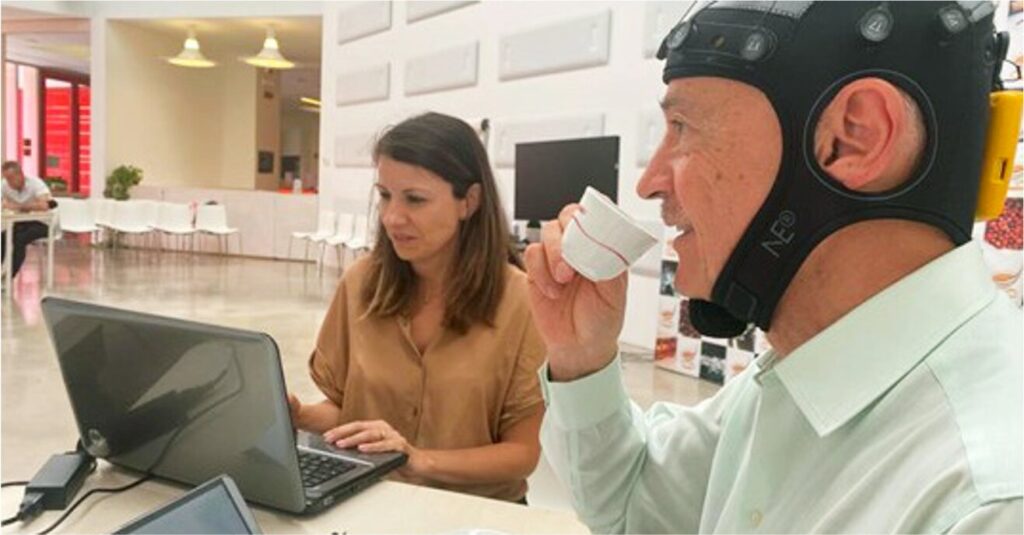An example of a panelist monitored during EEG recording at the International Coffee Tasting 2022 Summer Session held on the grounds of Mumak Academy in Binasco, Milan, Italy in July 2022.Provided by: Italian National Research Council
× close
An example of a panelist monitored during EEG recording at the International Coffee Tasting 2022 Summer Session held on the grounds of Mumak Academy in Binasco, Milan, Italy in July 2022.Provided by: Italian National Research Council
Italian researchers have introduced a new approach to assessing coffee quality. In a pioneering new study, they demonstrated the feasibility of using wearable technology to measure coffee professionals' emotional responses during tastings.
Published in Journal of Food and Agriculture ScienceThis study provides an innovative solution to reduce judgment bias that can arise from traditional, more subjective coffee quality assessment methods.
Coffee is one of the world's most popular and widely consumed beverages, with a growing number of enthusiasts around the world. Traditionally, evaluation of coffee properties has relied on trained panelists and standardized questionnaires, leading to potential bias. However, this study represents the first example in the scientific literature where wearable sensors have been used to investigate the implicit emotional responses of experienced coffee judges.
Lucia Biresi, a researcher at the Institute of Clinical Physiology of the Italian National Research Council (IFC-CNR) and corresponding author of the study, said: “This study has the potential to open new perspectives in the sensory analysis of coffee tasting. There is a gender,” he said. “Apart from regular questionnaires, panelists and judges can be equipped with minimally invasive equipment to monitor emotions that trigger physiological responses.”
To monitor physiological responses, the team equipped judges at an international coffee tasting competition in Milan, Italy, with sensors that measure electrical activity in the heart, brain, and skin.
Alessandro Tonacci, biomedical engineer at IFC-CNR and lead author of the study, explained the importance of the measured biomedical signals.
“We used electrocardiogram (ECG) signals, galvanic skin response (GSR), and electroencephalogram signals (EEG). ECG measures the electrical activity of the heart muscle and can provide information about branches of the autonomic nervous system. Yes, they are responsible for alertness and relaxation, respectively.
“GSR is related to human electrical skin activity, which correlates with emotional states and is under direct control of the sympathetic nervous system.Finally, EEG measures brain electrical activity at the scalp level and “Provides information about the activation and connectivity of specific brain regions and the connectivity between specific brain regions.”
This finding reveals a significant correlation between these biosignals and data obtained from traditional questionnaires across all sensory domains, and suggests the implementation of approaches to enhance coffee quality assessment. Possibility confirmed.
Billeci noted that the results could have broader implications in the field of neuromarketing. “This approach, coupled with continued advances in artificial intelligence tools, has the potential to guide consumers to choose coffee blends that are more emotionally satisfying. 'while also potentially influencing users to choose more ethical and sustainable products,' she said. 'It's sensory gratification.'
The team is currently seeking to raise funds to carry out other research in specific use case scenarios related to coffee production and distribution, and to look beyond coffee. “We are currently conducting other investigations into different biological matrices associated with food and beverages, for example certain wines,” Biresi said.
For more information:
Alessandro Tonacci et al., “Tasting Emotions: Piloting a New Sensor-Based Approach to Emotion Analysis During Coffee Tasting.” Journal of Food and Agriculture Science (2023). DOI: 10.1002/jsfa.13172
Magazine information:
Journal of Food and Agriculture Science
Provided by: Chemical Industry Association


